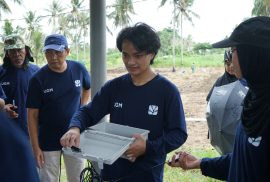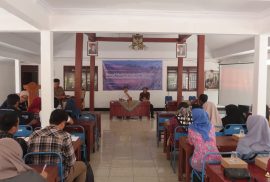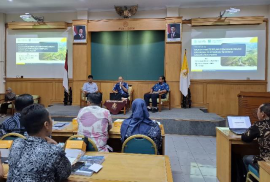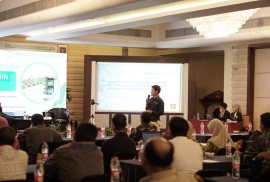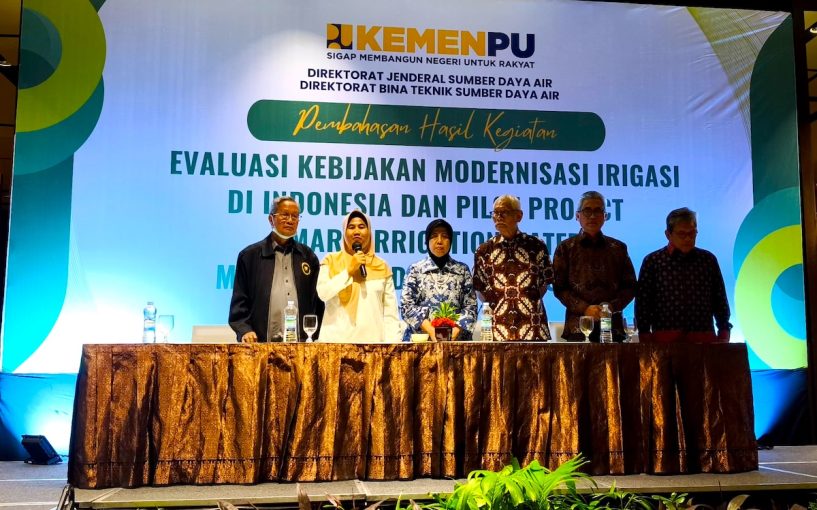
Modernization of irrigation systems in Indonesia has entered a new chapter with the launch of SIPASI 2.0 (Irrigation Management System Version 2.0) during the Workshop on Irrigation Modernization Evaluation and Smart Irrigation Water Management Pilot Project in Makassar on May 26-27. This launch marks a significant milestone in efforts to enhance the efficiency of water resource management to support national food security.
The Dean of the Faculty of Agricultural Technology at UGM, Prof. Dr. Ir. Eny Harmayani, stated that SIPASI 2.0 is a manifestation of the academic community’s commitment to supporting irrigation modernization through research and expertise. This web-based system was developed by the Center for Irrigation Modernization and Agriculture Studies at FTP UGM in collaboration with the Directorate of Technical Development, Directorate General of Water Resources at the Ministry of Public Works and Public Housing (PUPR).
“SIPASI 2.0 has been designed to accommodate the implementation of irrigation modernization in Indonesia in line with global societal demands. The goal is to improve service levels, efficiency, effectiveness, and water productivity,” she explained.
Prof. Eny Harmayani, along with the Sub-Director of Water Resources Data and Information, Dr. Dian Kamila, officially launched SIPASI 2.0 by pressing the SIPASI 2.0 button together with irrigation modernization advisors present at the event, including Ir. Soekarsno, Dipl.HE, Ir. Djito, SP1., Prof. Dr. Ir. Sigit Supadmo Arif, and Ir. Andi Sudirman, M.T. This launch was a significant moment in the agenda of the first day of the workshop, which was officially opened by the Director of Technical Development, Dr. Ir. Muhammad Rizal, M.Sc.

A team of experts, including Prof. Dr. Ir. Sigit Supadmo Arif, Dr. Ir. Murtiningrum, S.T.P., M.Eng., Ir. Andri Prima Nugroho, S.T.P., M.Sc., Ph.D., and Yohanes Sujut Triyanta, presented the results of the Smart Irrigation Water Management Pilot Project through the development of SIPASI 2.0. This system has been implemented in the Pamukkulu and Tabo-Tabo Irrigation Areas (DI) as a model for applying information technology in modern irrigation management.
Director of Technical Development, Dr. Ir. Muhammad Rizal, M.Sc., emphasized the importance of irrigation modernization, which has been initiated since 1985. Indonesia has anticipated this need by forming the Indonesian Irrigation Modernization Team since 2011. SIPASI 2.0 serves as a technological solution to address the challenges of modernization.
“With SIPASI 2.0, we hope to significantly improve irrigation efficiency and contribute to enhancing national food security,” he stated.
On the second day of the workshop, participants visited the Tabo-Tabo Irrigation Area to witness the implementation of SIPASI 2.0 at the Water Operation Center. This visit provided practical insights into the mechanisms and benefits of the SIPASI 2.0 platform in optimizing irrigation water management. Demonstrations of SIPASI 2.0 at the site offered valuable insights into the effectiveness of this platform in creating more modern and efficient irrigation systems.

The implementation of SIPASI 2.0 in the Pamukkulu and Tabo-Tabo Irrigation Areas, combined with findings from the evaluation of irrigation modernization policies, is expected to serve as an important model and reference in developing irrigation modernization strategies in Indonesia. By utilizing information technology and integrated water management systems, it is hoped that irrigation efficiency will significantly increase, thereby contributing to national food security.

